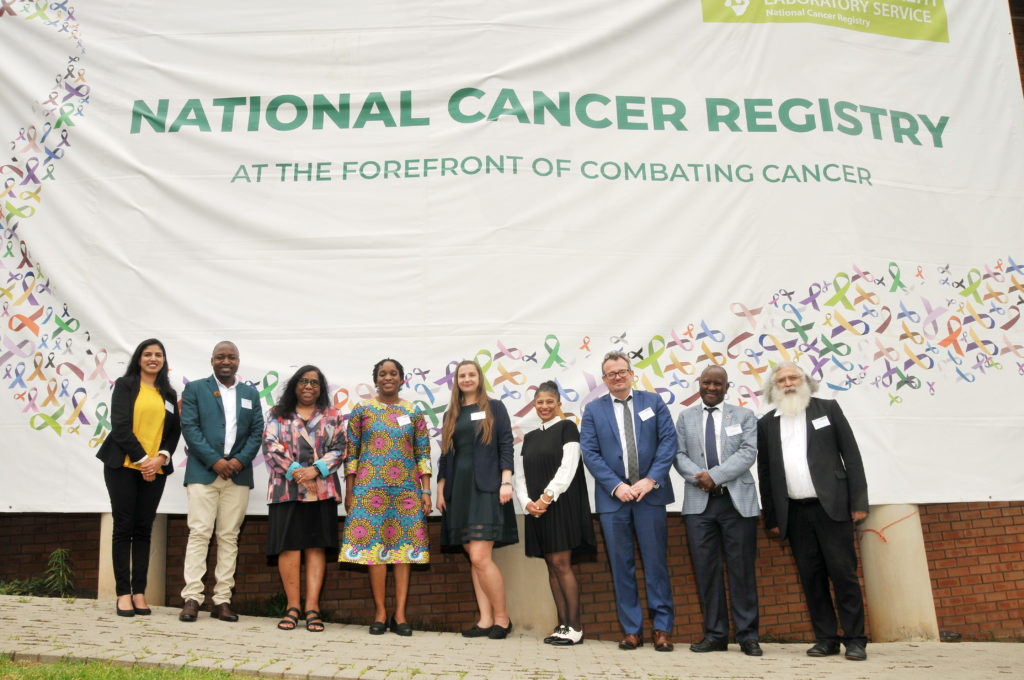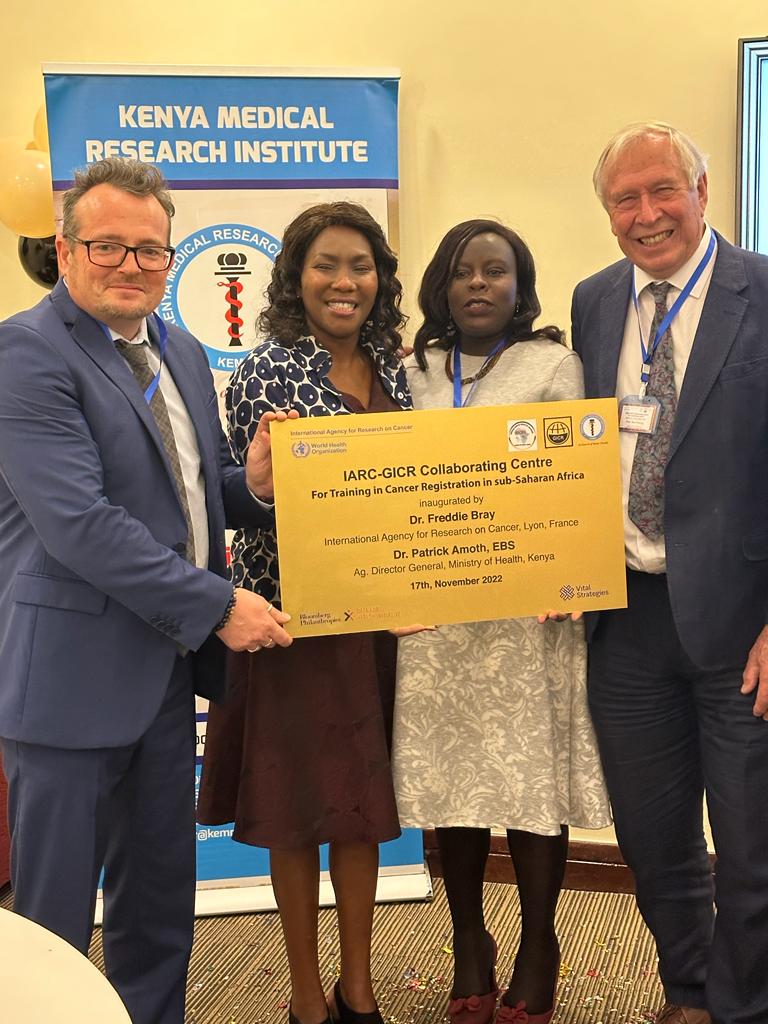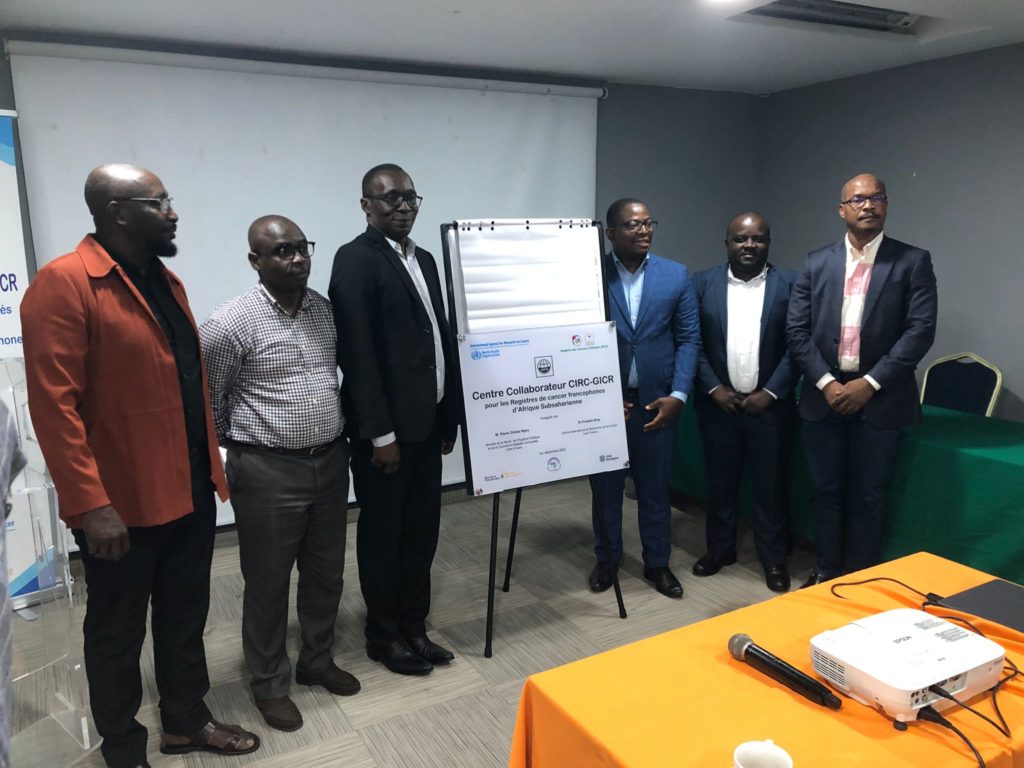
Against the backdrop of an increasing cancer burden in Africa and limited data to help direct government resources for prevention and treatment, three Collaborating Centers were opened in Kenya, South Africa and Côte d’Ivoire to strengthen cancer registration across the continent.
Established within the framework of the Global Initiative for Cancer Registry Development (GICR), these Collaborating Centers were launched by the International Agency for Research on Cancer (IARC) and partners in Nairobi, Johannesburg and Abidjan.
Get Our Latest Public Health News
Join our email list and be the first to know about our public health news, publications and interviews with experts.
“We need data to be able to make policies that are relevant and to actually understand what are the causes of cancer in sub-Saharan Africa, so that we can be able to control it,” said Dr. Mazvita Muchengeti, Senior Epidemiologist at the National Cancer Registry of the National Health Laboratory Services in South Africa. “I am excited to be part of the team that is going to change that, to provide accurate data and explore risk factors for cancers in Africa so that our policies are relevant, and they actually achieve what we want them to achieve.”
The development of the Collaborating Centers is the result of efforts to convene cancer surveillance expertise within Africa to provide training and technical assistance to strengthen cancer registration throughout the region. The centers are the result of a partnership including the International Agency for Research on Cancer (IARC), the World Health Organization (WHO), and the African Cancer Registry Network (AFCRN), as well as Vital Strategies, which provides financial and programmatic support through the Cancer Registries Program, a component of the Data for Health Initiative funded by Bloomberg Philanthropies.
“Cancer registries are a foundation for cancer control, yet these systems are chronically under-resourced in many countries,” said Dr. Magdalena Paczkowski, Director of the Cancer Registries Program at Vital Strategies. “As noncommunicable diseases rise in the region’s aging population, these Collaborating Centers have a vital role to play in controlling this growing burden by providing the data upon which cancer control planning and investments can be based. By developing and establishing a network of experts to train and provide technical expertise to others, these countries can help sustain the growth and development of expertise in cancer registration within the region.”
“The cancer burden is rapidly increasing, and the need for better data for cancer control on the African continent has never been more urgent,” said Dr. Freddie Bray, Head of the Cancer Surveillance Branch at IARC. “The IARC-GICR Collaborating Centers are due recognition of the local expertise in cancer registration in Côte d’Ivoire, Kenya, and South Africa, from which capacity in cancer registration across the region can be built.”
The first of the IARC-GICR Collaborating Centers was launched in November 2022 at the Nairobi Cancer Registry, which is within the Population Health and Surveillance Division of the Kenya Medical Research Institute (KEMRI). The Collaborating Center benefits from the registry’s long-standing expertise in cancer registration and the institute’s dedicated facilities for education. Its main focus is on providing support to African countries through regional training courses and the implementation and development of IARC’s CanReg5 software, a global open-source tool which is used by all African Cancer Registry Network members to input, store, check, and analyze population-based cancer registry data.

Later that month, the second IARC-GICR Collaborating Center opened at the South African National Cancer Registry in Johannesburg, which is housed within South Africa’s National Health Laboratory Service. The National Cancer Registry has considerable technical expertise and provides African countries with support to population-based cancer registries for record linkages—which supports research and cancer control planning by allowing for opportunities to link to other unrelated databases (e.g., risk factors, screening) as well as for registration of childhood cancers.
In December, the third IARC-GICR Collaborating Center was inaugurated, at the Abidjan Cancer Registry within the Centre Hospitalier Universitaire de Treichville in Abidjan, Côte d’Ivoire. Through the registry’s technical expertise, the Collaborating Center delivers training in best practices to collect and analyze data, and in the use of the CanReg5 software for all French-speaking countries across Africa.

“Through this project, we hope to educate countries on the importance of a cancer registry as part of a public health strategy, especially for eliminating cancers like cervical cancer and other cancers,” said Dr. Franck Gnahatin, Head of Abidjan Cancer Registry.
“The IARC-GICR Collaborating Centers are a milestone in the continuing efforts to ensure the sustainability of population-based cancer registries through capacity-building,” said Dr. Max Parkin, Coordinator of the African Cancer Registry Network and a Senior Visiting Scientist at IARC. He added that registry staff operating in 46 countries across Africa will benefit from the centers’ provision of technical assistance and training.
“Establishing these Collaborating Centers recognizes the existing data and expertise of these trailblazing countries,” said Jennifer Ellis, who leads the Bloomberg Philanthropies Data for Health Initiative. “Bloomberg Philanthropies is proud to support these centers to ensure that cancer registry data is impactful for countries making critical decisions on cancer control.”
About Vital Strategies’ Data for Health Cancer Registries Program
The Data for Health Cancer Registries Program works with ministries of health and their partners to establish, strengthen and expand population-based cancer registries and use the data for policymaking. Through this program, we support countries in establishing and bolstering population-based cancer registries to track cancer data, allowing them to better understand the burden of prevailing cancers and respond effectively. Each country collaboration focuses on strengthening existing registries, establishing new ones where appropriate, and technical assistance and training activities. Our goal is to support a sustainable registry system to strengthen data-driven planning, including informing cancer control and prevention activities, prioritization, budgeting and policy development.